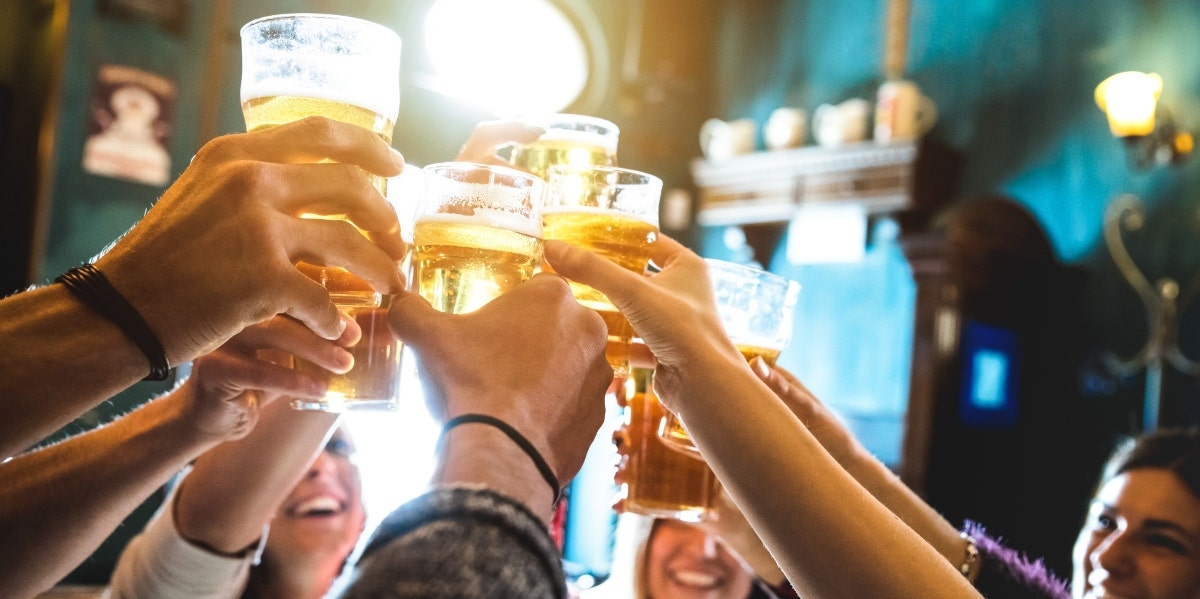How To Stop Blacking Out When Drinking Alcohol
It's scary to wake up with no memories of your night out.
 view apart / shutterstock
view apart / shutterstock Heavy drinking can lead to getting blackout drunk, but sometimes it also seems to happen when you don't drink too much.
There are also two different types of blackouts.
The first type, called a "fragmentary blackout," is the most common. It's characterized by spotty memories of events, with “islands” of memories separated by missing periods of time in between. This type is sometimes referred to as a gray-out or a brownout.
The second type is complete amnesia called an "en bloc" blackout, which can often span hours. With this severe form of a blackout, your brain fails to form memories at all and your mind can't recall any events from the night.
Some things that cause blackouts include drinking on an empty stomach, excessive drinking, and sometimes even mixing different alcoholic beverages.
Drinking to the point of blackout is not good and can even be a sign of alcoholism or a drinking problem. Blackouts can also lead to a lot of terrible side effects, including memory loss, an inability to form new memories, and an increased risk of liver disease, among many other things.
Luckily, there are ways to stop blacking out when drinking alcohol, and how to control your alcohol use.
6 Ways To Stop Blacking Out While Drinking
1. Make sure to eat.
If you are going out with friends and you know there will be drinking involved, make sure to eat a meal beforehand. Drinking on an empty stomach can greatly increase your chances of blacking out while drinking because of how the body processes alcohol.
It’s also important to drink water before you start drinking, during, and after. Staying hydrated can help you avoid a blackout.
2. Sip your drink instead of chugging.
The faster you drink, the faster you will become drunk. It’s better to sip on your drink to give your body time to process the alcohol and decrease your chances of getting too drunk too quickly.
“If your tolerance level is low, you will black out quicker than someone with a higher tolerance level,” says Keya Murthy, a clinical hypnotherapist and addiction expert. “Just because you can tolerate it doesn’t mean you keep drinking.”
You can even switch from drinking alcoholic drinks to drinking the virgin alternative.
3. Avoid strong drinks.
The best way to limit your chances of blacking out is to drink alcoholic beverages that aren’t too strong. That means avoiding taking straight shots and pouring too many shots into a single drink. The weaker the drink, the longer it will take to consume it.
4. Modify what's in your cup while playing drinking games.
Playing a classic drinking game can be fun, but it is also a sure way to get too drunk and end up blacking out. It’s best to simply avoid them, or if you do play them, switch to water when you find yourself taking too many sips from your drink.
5. Give yourself a limit.
Before you go out for the night, give yourself a mental number of how many drinks you are going to have. Keep the number low and space it out throughout the night.
Once you’ve reached your limit, then you can switch to water or something non-alcoholic. You can even write the number on your hand as well, just to keep track and make sure you don’t forget.
6. Have a sober night.
There is nothing wrong with going out and choosing not to drink at all. You can have the same amount of fun as everyone else by simply not getting drunk.
It’s the best way to ensure that at the end of the night you aren’t blacking out and that you will get home safe and sound.
If you or someone you know is suffering from addiction, there are resources to get help.
The process of recovery is not linear, but the first step to getting better is asking for help.
For more information, referrals to local treatment facilities and support groups, and relevant links, visit SAMHSA’s website. If you’d like to join a recovery support group, you can locate the nearest Alcoholics Anonymous or Narcotics Anonymous meetings near you.
Or you can call SAMHSA’s National Helpline at 1-800-799-7233, which is a free 24/7 confidential information service in both English and Spanish. For TTY, or if you’re unable to speak safely, call 1-800-487-4889.
Nia Tipton is a writer living in Brooklyn. She covers pop culture, social justice issues, and trending topics. Follow her on Instagram.

